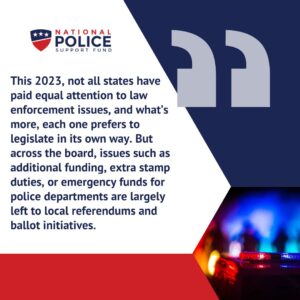Nestled between a midterm and a presidential, 2023 is the kind of year where politics slide to the backburner. However, the legislative machinery is still turning its gears around the country, and many of the bills and referenda presented deal directly with law enforcement issues.
So what happened while most of us weren’t looking? Which states are proactively changing the rules for law enforcement? What struggles can we expect during the next legislative year? Our 2023 roundup may look like statistics, but it will hint at a roadmap for our upcoming strategies.
2023 Was a Productive Year
First, let’s look at the country as a whole. Not all states have paid equal attention to law enforcement issues, and what’s more, each one prefers to legislate in its own way. But across the board, issues such as additional funding, extra stamp duties, or emergency funds for police departments are largely left to local referendums and ballot initiatives. Meanwhile, the State House or Assembly tends to deal with the larger “rules of the game;” therefore, the impact of their bills will be felt for much longer.
When looking at the number of bills per state, we found a few surprises:
The “busiest” state was Texas, which presented 115 bills that dealt directly with law enforcement. Out of these, 25 were already passed and exacted. This is not a huge surprise: vast, highly populated, and with a penchant for dealing with state matters directly, the Texas State Legislature is always worth watching out for.
They are closely followed by Minnesota and Massachusetts, two relatively active states, with 113 and 95 bills each.
So who gave us a surprise?
First, the relatively small and peaceful Connecticut punched above its weight, with 66 law enforcement bills presented this year. By comparison, Florida, which has 7 times the population of Connecticut, only had 20 bills that directly dealt with law enforcement; while Colorado, with just under twice the population of Connecticut, presented 6 law enforcement bills.

Finally, it’s one thing to draft a bill proposal and another one to pass it. This year, the “toughest” state was Arizona. They presented 29 law enforcement bills but had the largest number of vetoes in the country (3).
What Were All These Laws About?
With over 2200 bills and draft legislation, it would be impossible to examine every single one or determine the full implications of the last legislative year.
However, a close examination will reveal certain patterns to watch out for. So let’s look at what States are legislating about – and what they are failing to pass.
Certification and Training
Whether it’s the entry conditions or the requirements to climb up the institutional ranks, Certification and Training concerns determine who gets to be a Law Enforcement Officer and who gets to lead them.
Thorough training creates more prepared officers who can best deal with the job’s demands. However, it also takes money – which many States are not as willing to give.
In 2023, different State legislatures presented 306 bills on this topic. Out of them, 85 passed.
Two particularly important ones? One from Rhode Island added extra requirements for the Firearm use qualification (RI 2 333), which is currently awaiting approval from the Senate. Then, in South Carolina, demanding mental health evaluations for all prospective Law Enforcement officers (SC S 223). This one is pending approval by the South Carolina Senate Judiciary Committee.
Officer Safety
Everyone seemingly agrees that law enforcement officers should be able to carry out their tasks safely, with enough equipment and support to guarantee success – or to catch them in the event of an accident. However, not all States are willing to create the conditions for this.
In this regard, 2023 was a mixed bag. We saw 248 bills nationwide, out of which 98 were already enacted. However, we saw several failed bills meant to help officers who suffer from PTSD.
On the other hand, representatives in Florida and Massachusetts presented bills that increased penalties for harassing or assaulting police officers. In the latter case, bill MA S 986, which will make it possible to classify these crimes as “hate crimes,” is currently pending Senate approval.
Use of Technology
Surveillance technology is a hot topic in almost any arena, especially within law enforcement. It should not come as a surprise, then, that this year saw more than 160 State bills about it.
Many dealt with body cameras, either mandating their use or penalizing officers who turn them off. Such bills were presented in Alabama, Connecticut, Georgia, Illinois, Minnesota, Massachusetts, New York, and Oregon. Another common topic was the use of surveillance technology for traffic violations, facial recognition, or crime prevention.
Use of Force
Sometimes, to deal with criminals, it is necessary to be tough and proactive. While this undoubtedly saves lives, it is also a frequent complaint of many anti-police activists. Many laws that regulate the use of force by law enforcement are drafted with lofty ideals but lack realistic knowledge of day-to-day operations. However, these bills can potentially victimize or hinder police departments, so we must always keep an eye out for them.
In 2023, we saw 154 state bills that dealt with the “excessive” use of force by police officers. 17 failed, while many others are still pending debate or approval by their Upper Chamber.
Some of the most important ones?
- AK S 32, a Chokehold ban that is currently pending approval in Alaska
- CA A 897, from California, requires tougher investigation on incidents where the use of force results in a civilian death
- CT H 5365, which unfortunately failed, and attempted to restore Qualified Immunity for police officers.
What Comes Next?
For National Police Support Fund, the answer is simple: more vigilance and larger campaigns. Many of the bills we described today are pending further commentary or discussion by State Senates or Special Commissions. These will likely occur during early 2024.
Image Source: Canva








